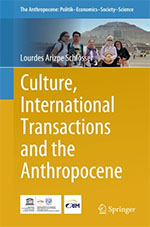APESS
Vol 17 |
Lourdes Arizpe Schlosser: Culture, International Transactions and the Anthropocene (Cham: Springer- Springer International Publishing, 2019).
ISBN: 978-3-642-41601-9 (Softcover)
ISBN: 978-3-642-41602-6 (EBook)
Doi: 10.1007/978-3-642-41602-6 (add chapter no.)
Order this book on Springer Website
|

|
Achieving a new understanding of sustainability transition in the Anthropocene requires a deeper analysis on culture. The development of new positions of international institutions, national governments, scientific organizations, private fora and civil society movements on culture and nature shows how global transactions must take place in a rapidly transforming world. This book analyses how these transactions have been progressively conducted and negotiated in the last 25 years. It provides a multi-situated ethnography of live debates on culture, global environmental change, development and diversity directly recorded by the author as a participating and decision-making anthropologist from 1988 to 2016. It examines the politicization and internationalization of culture by recognizing, negotiating and diversifying views on cultures and re-thinking culture in the Anthropocene. The merging of science and policy in taking up cultural and natural challenges in the Anthropocene is discussed.
- The book gives a wealth of data on international debates on culture and global change 1988-2016.
- The data provided in this multi-situated ethnography are unique, directly recorded in international live debates by the author.
- The book develops a new anthropological method to analyse global processes. - A cultural approach to the Anthropocene is explored.
|